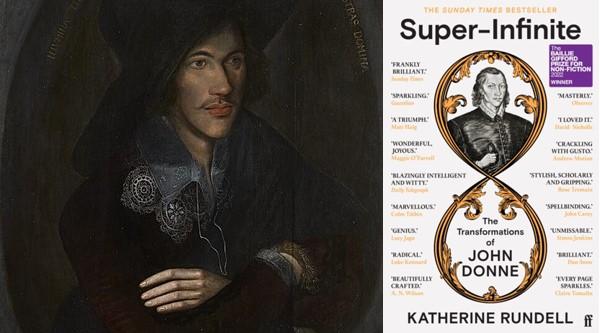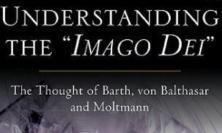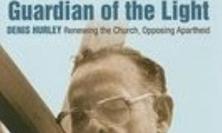Even among those who know John Donne – Renaissance love poet and preacher of Saint Paul’s – few have felt their way into the wordsmith’s life with the sparkling deftness of Katherine Rundell. Super-Infinite is a book that deserves the accolades heaped upon it, and which every lover of Donne should own.
With a vivid concision worthy of Donne himself, Rundell traces successive scenes in his formation: Donne as child prodigy, young scholar, dandy, ambivalent convert, naval adventurer, foolhardy lover, depressed father, flatterer, preacher, widower, diplomat and dean. Which of these experiences, poses and masks give us the key to Donne? All of them, answers Rundell: Donne had a super-infinite ability to reinvent his chameleon self.
Readers of Thinking Faith will find the reluctant convert of particular interest. We see the twelve-year-old Donne, scion of a family tree bristling with Catholic martyrs (including the great Thomas More), clutching the hand of his fiercely pious mother Elizabeth on a visit to his Jesuit uncle Jasper, who was then languishing in the Tower of London. Donne was a decoy, designed to draw attention away from the messages that his mother was ferrying from another Jesuit, William Weston. Donne was not caught that time, but his brother Henry would not be so lucky. Found to be sheltering a priest, Henry died of the plague in Newgate prison. That brought the number of Donne’s relatives to have died for their faith to a harrowing eleven.
Years later, the idea of the Tower’s monstrous jailer would continue to haunt Donne, and images of sick and dissected bodies litter his work. He must have felt what we would nowadays call trauma, the smouldering fear of belonging to a hunted group. Perhaps Donne’s later decision to write against Catholics was an attempt to exorcise this fear. Perhaps he simply recognised that abnegation of Catholicism’s harder edges was the necessary price of advancement. Or perhaps his study honestly convinced him that Catholicism was mistaken on controverted points. Whatever the reason, Donne will later argue in Pseudo-Martyr that Catholics preferring martyrdom to the Oath of Allegiance were not saintly but stubborn; indeed, in Ignatius His Conclave, he will banish the founder of the Jesuits to hell.
John Carey, author of an earlier, brilliant biography of the poet, imagines Donne racked with the guilt of an apostate. The religious attitude of Donne which for me rings the truest, however, is that of the incomparable ‘Satire III’ where Donne rages against authoritarian narrowness – whether found in the reformed, established or Roman church. Counterbalancing the Holy Sonnets, where Donne insists in Calvinist mode that God must do everything (‘Except you enthrall me, [I] never shall be free’), Donne here urges the laborious ascent of a purgatorial mountain towards religious truth. Only those who make the hard ascent attain the alpine serenity near God himself.
I recently had the pleasure of leading an introductory workshop on Donne at the London Jesuit Centre. It was beautiful to see how ‘Satire III’ spoke to those present, who between them represented a spectrum of Christian persuasions, at different moments in their own faith journeys. Our group was diverse in terms of ethnic and cultural heritage, age and professional experience. I recommended Super-Infinite to them all, because in it we glimpse so many of Donne’s facets – young and old, outsider and establishment figure, creature of his own time and unexpectedly relevant interlocutor of our own.
For me, Donne still speaks with incomparable intensity to realities we each must face: death, the ultimate parting; and love, the union which promises to rejoin and so recover what was lost.
Which love? Donne explores them all. In the wonderfully sensuous ‘To His Mistress Going to Bed’, he desires physical union of bodies; in the beautiful ‘A Valediction: Forbidding Mourning’, by contrast, he boasts that the union of souls renders bodily distance irrelevant: again, in the calm synthesis of ‘Air and Angels’, he explains that love demands both body and soul. Meanwhile, in the verse letters, spousal love is put aside altogether in favour of friendship – ‘Sir, more than kisses, letters mingle souls’.
It is impossible to know how far these poems record the discoveries of real loves, and how far they are performative. On the one hand, the poems were certainly used as calling cards or miniature CVs – little demonstrations of his employable talent. On the other hand, he did live a tempestuous love of his own.
Just launched upon a promising career as the secretary to Sir Thomas Egerton, Donne made the professionally disastrous move of clandestinely marrying Anne More, an in-law of his employer. The enamoured groom was thrown, like his brother before him, into jail. Eventually released when the marriage was judged valid, Donne found himself in debt and out of a job. Over the ensuing sixteen years of his marriage, he struggled to provide for the twelve young lives his wife would bear him – two of whom entered the world stillborn, and three of whom died young. It was at times so bleak for Donne that he wrote a daring defence of the legitimacy of suicide entitled Biathanatos.
That work is part of Donne’s larger attempt, as I have argued elsewhere, to make death artistic. Partings, including the parting of body and soul, are inevitable; put into a poem, they become intentional, even beautiful. Donne puts off the necessary parting of the lovers in the comic tantrum of the aubade ‘The Sun Rising’. In more serious elegiac mode, the first and second Anniversaries transform the soul of deceased Elizabeth Drury into the elixir to re-enliven a dying world. Most seriously of all, Donne writes his own demise in real time. Meditations upon Emergent Occasions chronicles the stages of an illness that Donne thought would kill him, even before he dressed in his shroud and lay down in a coffin to practise for his own death.
I realise that I have strayed from writing a review into writing a eulogy of my personal Donne, supreme poet of love and death. And so I will stop here, begging readers to purchase a copy of Super-Infinite, and discover or re-discover their own Donne. Read it to trace Donne’s myriad-mindedness, including the surprising final twist of how a penniless widower became, at the king’s invitation, preacher at Saint Paul’s. In that, as in every chapter, Rundell is the best kind of guide: she sends you back to Donne’s own incomparable works with renewed appetite.
Currently on regency at Wimbledon College, Luke Taylor SJ taught Renaissance literature before becoming a Jesuit.






